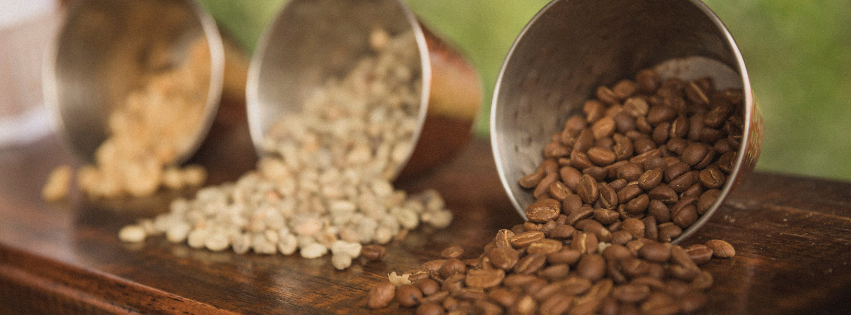We all know that the world of coffee is one that is fuelled by niche terminology, experimentation and a good dose of snobbery, as much as it is by caffeine. And nowhere is this more apparent than in the age-old argument of arabica vs robusta. In this article we will be delving deep into the topic, giving you the pros and cons of each variety and explaining why, when all is taken into account, there is room enough in the world for both of these (delicious) coffee varieties.
What is Arabica coffee?
To start off with, let's delve a bit into what Arabica actually is. Coffee, as we all know, comes from a tropical plant that is very particular about where it will thrive: only in the rather small coffee belt between the Tropic of Cancer and the Tropic of Capricorn and only within an incredibly narrow set of environmental conditions: Temperature, rainfall, sunlight, wind and soils have to all be just right - it’s pretty much the goldilocks of the plant world. While the plant may be called the Coffea arabica, there are three main coffee bean varieties that we drink - Arabica, Robusta and Liberica. The first two are by far the most common, making up over 98% of all coffee sold worldwide.
Arabica is the most popular of the two, with 100's of sub-varieties each with their own unique flavours and aromas. Arabica beans are often highly regarded, with many companies and coffee shops shouting about their 100% arabica coffee. But what is it that makes Arabica coffee so good, and is it even true that it is superior to its rival, Robusta?
What is the difference: Robusta vs Arabica
Arabica coffee is often highly regarded for its superior flavour profile when compared to robusta, and as such is usually what makes up single origin coffees, where their USPs rely heavily on subtle but discernible tastes and aromas. Arabica beans are known for their delightful combination of acidity, sweetness, and a diverse range of complex flavours, which vary widely, taking in a whole host of forms, from floral to fruity to nutty or chocolatey. Another aspect of arabica beans that makes them desirable to some is that they contain less caffeine than robusta, which also helps to contribute to a much milder and smoother taste, letting the notes shine through.
These beans, especially when grown in specific regions such as Ethiopia, Colombia, or Jamaica, are known to produce exceptional flavours and are much sought after the world over. The combination of acidity, sweetness, and diverse flavours in Arabica coffee is often considered superior by many enthusiasts.
Robusta, on the other hand, is characterised by its higher bitterness, high caffeine content and earthy, woody flavours. It's important to note that, while arabica is generally preferred for its more nuanced flavour, the quality of coffee is subjective, and some individuals may appreciate the bold and intense characteristics of robusta beans - they are particularly popular in cultures that favour dark roasts or traditionally bold flavour profiles.
There are coffee aficionados who have a strong affinity for the bold and intense characteristics found in certain varieties of robusta coffee, which all contribute to a distinctly different coffee experience. But in the end, the choice between whether to go for arabica and robusta will come down to personal taste and the specific flavour profile that each person enjoys in their coffee.
On the other hand, some coffee aficionados may have an affinity for the bold and intense characteristics found in certain varieties of robusta coffee, which all contributes to a distinctly different coffee experience.
The Arabica or Robusta Cheat Sheet:
Arabica coffee beans are generally considered superior to Robusta due to the taste and aroma, and are marketed as such so that retailers can sell them at a higher cost, but both varieties have their merits. Here's a breakdown of the key differences in the robusta vs arabica battle:
Taste:
Arabica: Smoother, sweeter, with fruity or nutty notes and a pleasant acidity.
Robusta: Harsher, stronger, with a bitter and earthy taste.
Caffeine:
Robusta: Packs a stronger caffeine punch, almost double the amount of Arabica.
Growing Conditions:
Arabica: Requires specific conditions, thriving at high altitudes and more susceptible to disease.
Robusta: Grows at lower altitudes and is more resistant to pests and diseases.
Price:
Arabica: Generally more expensive due to its delicate growing requirements.
So, is Arabica truly better? It depends on what you are looking for in a cup of coffee:
For a smoother, more complex flavour: Arabica is the way to go.
For a stronger caffeine kick: Robusta might be your choice.
For cost-effectiveness and hardiness: Robusta is a better option.
Interesting fact: Robusta is often used in espresso blends for its crema (the foamy layer on top) and strength, while Arabica beans contribute to the overall flavour profile.
What about Arabica and Robusta blends?
There's no simple answer to whether blended coffees are better than pure Arabica beans. It all boils down to your taste preference! Here's a breakdown of the pros and cons of each to help you decide:
As well as the appeal of nuanced flavours that can only be obtained from unique single origin coffees, coffee blends continue to appeal for everyday coffee and for an easy way to know exactly what you are getting (whether you are a coffee expert or newbie).
These are usually a mixture of a few varieties of single origin, with robusta added in. This brings with it a wonderful balance of flavour and strength: By combining different beans from various origins, roasters can create a specific flavour profile. You can find blends with a richer body, brighter acidity, or a more intense aroma with a blend than in single origins alone, and this can be more consistent as it does not rely heavily on outside factors, such as processing and harvest conditions that single origins need in order to achieve a certain result.
Then there is the cost. While Arabica is often associated with higher-quality, coffees. (By emphasising 100% Arabica coffee beans, companies target consumers who are after a premium taste experience and are willing to pay a bit more), it does mean that the cost is higher than what we are willing to pay for our daily brew. This is where blends that include cheaper robusta can help.
There are cons to opting for a blend though, however expertly crafted it may be.
Blending can sometimes mask the unique flavours of single-origin beans. If you enjoy the subtle nuances of different origins, a pure Arabica might be better to your taste. While it is crafted with care and attention, the overall flavour profile of the blend will be down to a roaster's expertise, and it may not always be one that you like.
Pro tip: If you're new to exploring different coffees, trying a well-made blend (such as our Everyday Espresso) can be a great way to discover what flavour profiles you enjoy and which you do not. Then, you can branch out into single-origin Arabica beans to delve deeper into specific taste preferences.
The best way to decide is to try both single-origin and blended varieties. You could turn robusta vs arabica into robusta AND arabica so that you can glean the benefits of both varieties after all.
Our favourite Arabica coffee beans
Now that we have looked at the argument of robusta vs arabica, let’s see what is considered to be the best arabica coffee beans coffee on the market. When it comes to determining which coffee is "best", it's important to recognise that this is an ephemeral concept and can be quite subjective, depending largely on individual preferences. Here are the coffee varieties currently ranked highly in the Coffee Bean Shop Roastery:
-
Yirgacheffe Coffee (Ethiopia): Known for its bright acidity, citrusy flavours, and floral hints, Yirgacheffe beans come from Ethiopia, considered the birthplace of coffee. These beans are prized for their clean taste and distinct character.
-
Kona Coffee (Hawaii): Volcanic soil and a unique microclimate contribute to Kona Coffee's well-rounded flavour profile. These beans are known for their smooth body, subtle sweetness, and sometimes nutty or chocolatey notes.
-
Blue Mountain Coffee (Jamaica): Jamaican Blue Mountain beans are famous for their mild acidity, well-balanced flavour, and lack of bitterness. They are strictly graded and often command high prices due to their limited production.
-
Sumatra Mandheling Coffee (Indonesia): Sumatra Mandheling beans are known for their full-bodied, earthy taste with herbal or spicy notes. The processing method, using wet-hulling, contributes to their unique character.

Whichever coffee floats your boat and gets you leaping out of bed in the morning, make sure it is the highest quality coffee available in the UK. We roast our carefully sourced coffee beans everyday, meaning that they are always super fresh, and always wonderfully delicious. Don’t believe us? Give our beans a try using our 25% off newbie discount: NEWBEANIE.

